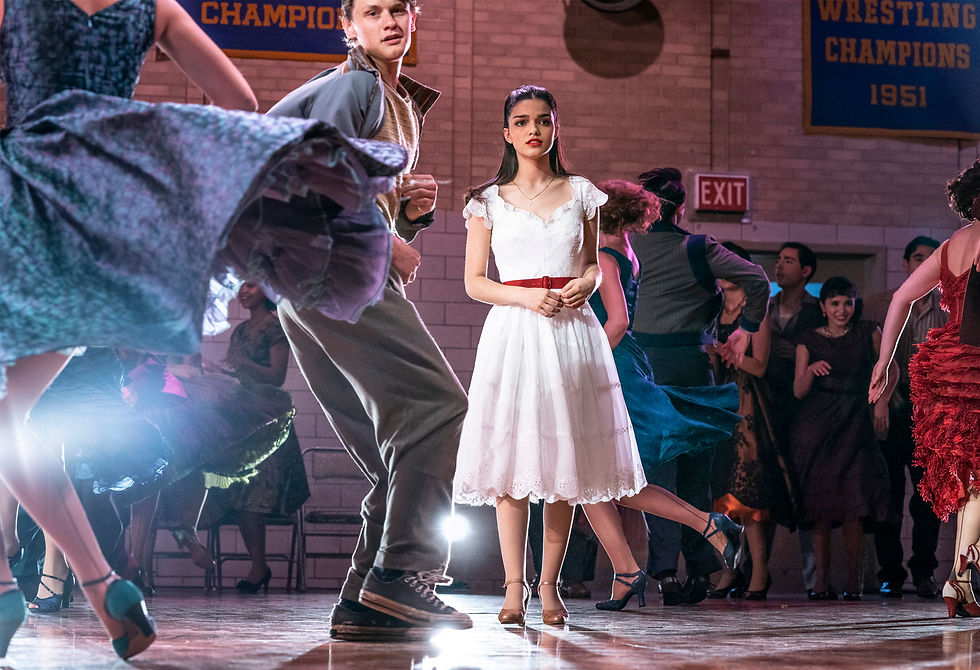West Side Story Review
- Emily Mackay Hennefer

- Dec 10, 2021
- 4 min read
Updated: Dec 20, 2021

When I first heard that Steven Spielberg wanted to remake one of the all-time great movie musicals, West Side Story, I just didn't understand why.
Spielberg brings a new diverse cast to the proceedings that is certainly welcome, but apart from that, he really couldn't improve on a movie that did everything else so right. He had to know that his version would be compared endlessly to that which came before, so thus I present a review that mostly does that--compare his film to one of cinema's greatest achievements. Sorry, Steven, it was inevitable.
West Side Story follows the love story of Tony and Maria, young lovers who both have ties to rival gangs in the 1950s. Tony and his best friend, Riff (Mike Faist), started the Jets, while Maria's brother, Bernardo (David Alvarez), is the leader of the Sharks. The two gangs hate each other and are constantly fighting for control of the streets. Riff plans to challenge Bernardo to a rumble, to determine who will finally get control, but little do they know that meanwhile Tony and Maria have a newfound love and that will soon pose problems for both sides.

Spielberg assembled a fine enough cast and their vocal talents are nothing to sneeze at. There's not a Pierce Brosnan in the group, thankfully, and everyone is able to carry their tunes just fine. Everyone does a great job, though no one necessarily feels like an upgrade either from the previous version (which, hey, both of the leads were dubbed, so they obviously used the strongest singers they could find). Ariana DeBose seems to be the standout here. She's fun to watch which is easy, really, because Anita is pretty much the best role. Speaking of Anita, Rita Moreno (who played Anita in the '61 version, and fills a Doc-like role here as Valentina) does fine, but feels more like a gimmick than anything else. Anytime she's on just feels like a distracting wink-wink, nudge-nudge to the audience.
This is Steven Spielberg's first musical and he chose to tackle the best one out there. While Spielberg does a fine job with the musical numbers' staging and choreography, he fumbles the most important element of the story, the crux of which everything depends-- the love story. One huge mistake happens right off the bat as we're introduced to one of our two leads, Tony (Ansel Elgort), as he sings his "I want" song with Something's Coming. In the 1961 version, he sings it to himself as he ponders all the possibilities that await him if he decides to listen to Riff and attend the dance. You truly feel like he's singing about his destiny. I get chills every time I hear it. Here in Spielberg's version, Tony isn't alone, but rather, he sings his song playfully to Valentina (Rita Moreno) rather than contemplatively to himself. Spielberg seems to be afraid to play it sincere and serious when it comes to the seeds of the romance, and always chooses to make the solos in this film a bit more lighthearted by including intentional or unintentional audiences. But by taking away the feeling of Something's Coming--that Tony has forces greater beyond himself pushing him to be at the dance--the meeting with Maria (Rachel Zegler) when it finally happens doesn't have the same impact. Tony and Maria don't come off as star-crossed lovers who were destined to find one another in this telling, they're much more two kids who just met and developed an instant crush. Sure, that's one way to tell the story of Romeo & Juliet, but it certainly lessens the impact of all their love stands for.

With their fizzled meet cute, nothing that follows feels as believable or worth the tragedy that soon occurs, and for this story, that's a big problem. The '61 version benefits from some amazing chemistry that Natalie Wood and Richard Beymer share (despite hating each other in real life!) as well as the otherworldly visual depiction that destiny is pushing them together. Everyone fades away when they're together and it's magic. In this version, they don't have that same chemistry. Their meeting is cute, but mostly a bit awkward. In the original, you feel the passion when they have their moment on the balcony singing Tonight. Here it definitely makes you wanna say, "But you two barely know each other."
It's fine to read the text this way and point that out if that's the commentary Spielberg wanted to make, but it makes the decisions the pair make near the end of the film a lot more shallow and incomprehensible. It makes me wonder if Spielberg saw West Side Story as a musical street fighting gang movie first and a love story second. He certainly prioritizes other parts of the story, which, is his prerogative, but the film suffers for it. If you, for whatever reason, really can't stomach watching a movie not made in this century, then by all means some West Side Story is better than none and this movie is a serviceable telling of the story. Otherwise, just watch the original because it is so much better.
RATING: 6/10













Comments